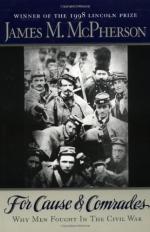
|
| Name: _________________________ | Period: ___________________ |
This quiz consists of 5 multiple choice and 5 short answer questions through Chapter 4, If I Flinched, I Was Ruined.
Multiple Choice Questions
1. When discussing soldiers not eager to fight, McPherson says derogatory comments about these men came from officers who had enlisted for all BUT WHICH of these reasons?
(a) Duty.
(b) Honor.
(c) Money.
(d) Patriotism.
2. As the excitement for battle raced across the country, the governor of Ohio said he could not send the requested thirteen regiments but would send how many?
(a) 8.
(b) 20.
(c) 5.
(d) 16.
3. When discussing various war memoirs, McPherson mentions that Wilbur Fisk, of the 2nd Vermont, wrote which of the following?
(a) Hard Marching Every Day.
(b) Hard Tack and Coffee.
(c) On the Altar of Freedom.
(d) The Rebel Yell and the Yankee Hurrah.
4. Which of the following Generals retrieved his character during the Battle of Fair Oaks?
(a) General Mercer Tomlinson.
(b) General Lewis Armistead.
(c) General James Thomas.
(d) General Willis Gorman.
5. When McPherson talks about the ways in which the eagerness for battle was not unique to Civil War soldiers, he mentions the same phenomenon during which war?
(a) World War I.
(b) World War II.
(c) Vietnam War.
(d) Revolutionary War.
Short Answer Questions
1. As "Chapter 4: If I Flinched I Was Ruined" opens, which of the following is NOT a traditional means of motivating soldiers to fight?
2. As McPherson discusses the initial impulse that prompted men to enlist on both sides after the raid on Fort Sumter he references which of the following French terms?
3. Which of the following was a major in the 19th Iowa, described in "Chapter 4: If I Flinched I Was Ruined," who would walk and let injured men ride his horse?
4. As "Chapter 2: We Were in Earnest" opens, McPherson says that another name for the Civil War is what?
5. During the discussion of leadership, which of the following Generals had a very different reputation at Gettysburg than he had earlier at Malvern Hill?
|
This section contains 331 words (approx. 2 pages at 300 words per page) |

|




